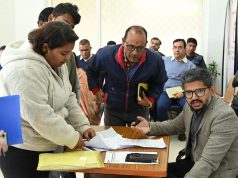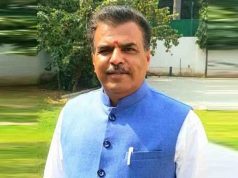U’khand Assembly passes UCC Bill by voice vote
By Arun Pratap Singh
Dehradun, 7 Feb: After two days of debate on the Uniform Civil Code (UCC) Bill tabled in the House yesterday morning, the Uttarakhand Assembly finally passed the bill by voice vote, today. While the Treasury members lavishly praised the efforts of the government, in general, and Chief Minister Pushkar Singh Dhami, in particular, for bringing in the “historic UCC Bill”, most of the Opposition members expressed their apprehensions regarding several provisions and also criticised the government for “rushing through” the bill.
 Those who participated in the debate today included Munna Singh Chauhan, Satpal Maharaj, Bhuwan Kapri, Saurabh Bahuguna, Sumit Hridayesh, Pritam Singh, Arvind Pandey, Khajan Das, Mohammed Shehzad, Shaila Rani Rawat, Renu Bist, Sarita Arya, Furkan Ahmed and Vinod Kandari. The Treasury members accused the Congress leadership of not complying with the orders of various courts and of delaying the UCC Bill despite several assurances given by them to bring the UCC Bill in Parliament from time to time.
Those who participated in the debate today included Munna Singh Chauhan, Satpal Maharaj, Bhuwan Kapri, Saurabh Bahuguna, Sumit Hridayesh, Pritam Singh, Arvind Pandey, Khajan Das, Mohammed Shehzad, Shaila Rani Rawat, Renu Bist, Sarita Arya, Furkan Ahmed and Vinod Kandari. The Treasury members accused the Congress leadership of not complying with the orders of various courts and of delaying the UCC Bill despite several assurances given by them to bring the UCC Bill in Parliament from time to time.
Responding to the debate just before the bill was passed, Chief Minister Pushkar Singh Dhami said it is the time for the truth to emerge and this bill is aimed to make the truth prevail. He thanked all assembly members, including those of the opposition, for sharing their thoughts on the UCC. He said that that, for the first time, there have been such long discussions during his term as Chief Minister of Uttarakhand.
He emphasised that the UCC isn’t any ordinary bill but an outstanding one. It is a dream that is going to become reality and will start from Uttarakhand. Dhami also congratulated the people of Uttarakhand on passing of UCC Bill with which history is being created. The CM claimed that it would present an example for other states of India and show the way to the rest of the country.
 Dhami reminded that certain cases came up in the high courts and the Supreme Court from time to time about women suffering due to denial of rights. Finally, they are going to get justice and this process would start from Uttarakhand.
Dhami reminded that certain cases came up in the high courts and the Supreme Court from time to time about women suffering due to denial of rights. Finally, they are going to get justice and this process would start from Uttarakhand.
The CM pointed out that there are many examples from various countries such as Saudi Arabia, Nepal, Japan, US, Canada, Bangladesh, Indonesia, etc., which have implemented the Uniform Civil Code. India has faced many challenges under PM Narendra Modi such as Corona, natural disasters, etc., yet the country remained strong and faced them stoically. Now the country is moving to become the world’s 3rd largest economy.
He also mentioned that, after several decades of struggle the Ram Mandir has been rebuilt in Ayodhya through the judicial process. This has also started the ‘Ram Yug’ in India.
CM Dhami said the government is working to empower women and ensure their safety legally and socially across India under PM Modi’s leadership. Uttarakhand can’t stay behind in doing such good work and implementing the UCC is an example of it.
Under Article-342 of the Indian Constitution, tribals of Uttarakhand have been kept out of UCC to ensure their rights. The draft forming committee that visited Chakrata, Dharchula, Nanakmatta, Sitarganj, etc., ensured their safety. Dhami also mentioned that UCC will ensure safety of children born outside marriage and from in live-in relationships are adopted. They will all be treated equally get equal rights on parental property. He reminded that the legal age for marriage of boys at 21 and girls at 18 years in UCC would ensure injustice being done to them through child marriage or other ill practices in certain communities would end with the UCC.
The CM also sought to make it clear that the bill does not intend to hurt any class or section of society but aims at removing the anomalies. He said the bill is fully in line with the dreams of the Constitution and the direction given by various courts, including the Supreme Court, from time to time. He also mentioned some legal cases to emphasise his point.
Dhami reminded that he had promised that if his government comes to power, again, he would form a committee to prepare a draft of the UCC which would then be presented in the state assembly for approval and implemented. He recalled that the committee formed by his government had begun talking to the people of Uttarakhand about UCC and sought the public’s suggestions. This was begun from Mana village. As many as 43 Jan Samwaad meetings were held and 2,72,000 suggestions received from the people of Uttarakhand on UCC. It took almost 2 years for the committee to present a detailed report on the UCC. His government received it on 2 February and he introduced it in the state assembly on 5 February without wasting any time. The UCC would not only ensure all constitutional rights for the people of Uttarakhand but also ensure that they are fully implemented and safeguarded legally. The UCC would also end all ill practices across various communities and ensure legal and social justice to all.
The CM claimed that UCC is completely different and above all castes, religions, sects, etc. It will provide equal rights to all without any discrimination and will ensure everyone’s progress. This was just the beginning and there would be much more to come. He said that India’s constitution is diverse and teaches the citizens a lot. There is need to rise above vote-bank politics and work for the wellbeing of the people of Uttarakhand and India. He also thanked all opposition members, cabinet ministers and the Vidhan Sabha Speaker for patiently listening to everyone at the historical special session meant for the UCC.
He mentioned that the injustice being done to women would now end. This UCC will take care of mothers, sisters and daughters and will stop ill-doings that were done with them. He added that this UCC will in true sense provide equality to about 50 percent population (women) of India and this will start from Uttarakhand.
He claimed that certain anti-social elements kept doing injustice to people from all segments of society. They kept dividing people on various grounds and kept nullifying the good parts of the Constitution. This will now end and this will start from Uttarakhand. He also remembered Babasaheb Bhim Rao Ambedkar, the architect of the Indian Constitution. He alleged that certain clauses mentioned in it were misused from time to time by certain anti-social, anti-national people. Certain mistakes were done in the Indian Constitution which now need to be corrected. And he is working in that direction while fulfilling the dream of Babasaheb Ambedkar. Now equal justice will be given to everyone through the UCC which remained denied till date.
Dhami added that the Constituent Assembly has made the subjects related to this a part of the concurrent list of the Constitution. So that along with the Central Government, the State Governments can also make laws on the Uniform Civil Code for their states. After all, why did the people who ruled for more than 60 years after independence not even think of implementing the Uniform Civil Code? Forgetting national policy, they continued to pursue appeasement politics only. This step of the state government is in line with the policy and principles written in the Constitution. It is also an important chapter towards women’s safety and women empowerment.
Earlier, participating in the debate, Munna Singh Chauhan very impressively put forward his points and also reminded the House of the past blunders that have to be dealt with. Some of his claims were strongly refuted by the Opposition members but he did not budge. He also claimed that the then Prime Minister of India, Jawaharlal Nehru, during the then Saudi Arabia king’s visit to Varanasi had ordered all signs and symbols at Gyanvapi to be covered with cloth. Similarly, Arvind Pandey also made some claims regarding the Ram Temple by the then Congress leadership, which were refuted as unauthenticated claims by the Opposition members, but Pandey also did not budge. Saurabh Bahuguna also took on the Opposition accusing it of doing nothing to remove the anomalies in society by avoiding UCC in order to appease a certain section of society and for its vote bank politics.
On the other hand, Mohammed Shehzad and Furkan Ahmed accused the government of targeting the Muslim community through this bill and, at the same time, excluding the tribals from its application.







